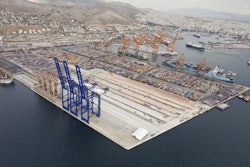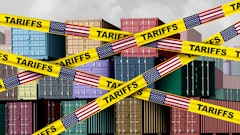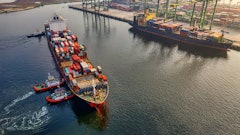Container throughput in Pakistan could rise dramatically if China succeeds in its ambition to build a new deepwater port in the country linked to China’s western hinterland, via a new intermodal corridor that China's state-owned China Overseas Port Holding Company took over the construction and operation of new container facilities at the port of Gwadar, located near to the Pakistan-Iran border, in November.
The concession to develop the port had previously been held by Singapore terminal operator PSA, which it won in 2007 with a commitment to spend $550 million into the project. However, a dispute over ownership of the land led to the development effectively being mothballed until the Pakistan government stepped in and ordered the transfer to the Chinese firm, which was accompanied by a commitment from the Chinese government to build road and rail links from the port to China’s westernmost city of Kashgar.
Chairman of the All Pakistan Shipping Association, Aasim Siddiqui, told delegates at last week’s TOC Container Supply Chain conference in Dubai that the development could transform cargo volumes in Pakistan.
“This is the most interesting, challenging and exciting development coming up that we are all looking forward to. If this development happens, and the road and rail links are built and are efficient then we could see some 5 percent of Chinese cargo moving through Pakistan,” he said.
He added this ultimately could represent an additional 8.6 million TEU per year passing across Pakistani quays as cargo between Europe and the Middle East and western China would see huge savings in distance by traveling overland through Pakistan, rather than being unloaded in Shanghai and the country’s other eastern ports, and transported overland in China.
The distance between Kashgar and Gwadar is 1,750 miles, and Europe-bound cargo routed via Gwadar would save over 5,000 miles compared with travelling to Shanghai and then being shipped via Singapore and the Straits of Malacca.
“Kashgar is a relatively undeveloped part of China, and for coming in from Europe if this is routed via Pakistan there will be huge distances saved, particularly if you are talking about road transport,” Mr Siddiqui explained.
Another key geopolitical factor behind the development is that it would secure an alternative route for Middle Eastern oil to reach China – and one which is not dependent on the critical Straits of Malacca remaining open.
Hans-Ole Madsen, senior vice-president for Europe and the Middle East for ICTSI, said that the intermodal element of the project was crucial.
“Rail is hopefully going to see some investment from the private sector now. Hopefully it will see the same success that the port sector has seen since private investment was invited into it – Pakistan’s government has provided quite a benign climate for private investors.
“I agree that Gwadar is very exciting. It is also very challenging – the construction of the rail and highway goes over some very rough terrain in the north of the country, and there are some very stubborn people living in that area. So you have to really make sure all the stakeholders are convinced,” he said.
To read more, click HERE.




















